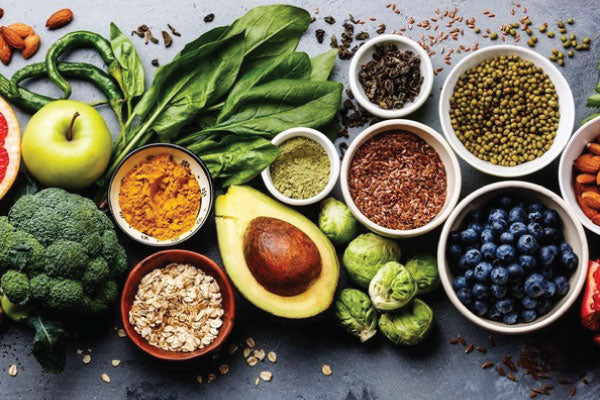Key Takeaways
-
Recognise the subtle warning signs — Symptoms like constant fatigue, digestive issues, and frequent joint pain may point to underlying chronic inflammation.
-
Prevention starts with awareness — Identifying inflammation early can help reduce risks linked to long-term conditions such as heart disease, diabetes, and autoimmune disorders.
-
Lifestyle makes a difference — Diet, exercise, sleep, and stress management remain the most effective ways to combat inflammation in 2025.
Inflammation is the body's natural defence mechanism, a crucial response to injury or infection. But what happens when this temporary defence turns into a persistent, low-grade fire smouldering within? This is chronic inflammation, a silent and often misunderstood condition linked to numerous long-term health issues. Unlike the acute swelling of a sprained ankle, its signals can be subtle and easily dismissed as normal signs of ageing or stress. From persistent fatigue that sleep cannot fix to mysterious aches and digestive woes, your body might be sending you signals that it needs support.
This guide will illuminate the most common and some lesser-known signs of chronic inflammation, providing a clear roadmap to understanding what your body is trying to tell you. We'll explore each sign in detail, delve into its underlying mechanisms, and offer practical, actionable steps you can take. We will also touch upon how high-quality, broad-spectrum CBD products can support the body's endocannabinoid system, potentially helping to manage discomfort and promote a state of balance, aiding your journey towards better wellness.
1. Persistent Fatigue and Low Energy
One of the most pervasive yet frequently overlooked signs of chronic inflammation is persistent fatigue. This isn't the ordinary tiredness you feel after a long day; it's a profound sense of exhaustion that adequate sleep doesn't seem to resolve. This deep-seated fatigue arises because the body is constantly expending energy to manage a low-grade, long-term inflammatory response.

Inflammatory messengers, known as cytokines (like TNF-alpha and interleukin-1), can directly impact the central nervous system. They disrupt the brain's energy regulation centres and interfere with the normal sleep-wake cycle, leaving you feeling drained and unrefreshed, even after a full night's rest.
What Inflammation-Related Fatigue Feels Like
This type of fatigue often presents as a complete lack of physical and mental energy. For example, individuals with inflammatory conditions like rheumatoid arthritis or inflammatory bowel disease (IBD) often report overwhelming morning fatigue or sudden "energy crashes" that make daily tasks feel monumental. It's a heavy, persistent exhaustion that significantly impacts your quality of life.
Actionable Steps to Combat Inflammatory Fatigue
If you suspect your low energy is one of the signs of chronic inflammation, consider these targeted strategies:
- Keep a Fatigue Diary: Track your energy levels throughout the day alongside your diet, stress levels, and activities. This can help you identify specific triggers and patterns.
- Prioritise an Anti-Inflammatory Diet: Focus on incorporating foods rich in omega-3 fatty acids, such as salmon and mackerel, and colourful fruits and vegetables packed with antioxidants.
- Maintain a Consistent Sleep Schedule: Going to bed and waking up at the same time every day, even on weekends, helps to regulate your body's internal clock.
- Speak with Your GP: Discuss getting blood tests to check for inflammatory markers like C-reactive protein (CRP) and erythrocyte sedimentation rate (ESR). It's also vital to rule out other potential causes like thyroid disorders or sleep apnoea.
2. Joint Pain and Stiffness
Among the most recognised signs of chronic inflammation is persistent joint pain and stiffness. This isn't the temporary ache from overuse or a minor injury. Inflammatory joint pain is distinct, often characterised by swelling, warmth, and a deep-seated stiffness that is typically worst in the morning and can improve with gentle movement. It occurs when the immune system mistakenly targets the body's own joint tissues, releasing inflammatory mediators that cause pain and can lead to joint damage if not addressed.

This internal assault on the synovium, the lining of the joints, is what differentiates it from mechanical "wear-and-tear" arthritis. The inflammation leads to a painful, swollen state that can significantly restrict mobility and daily function.
What Inflammation-Related Joint Pain Feels Like
This type of joint discomfort often manifests systemically and symmetrically. For example, individuals with rheumatoid arthritis may experience pain and swelling in the small joints of both hands and feet simultaneously. Conditions like psoriatic arthritis can cause entire fingers or toes to swell up, a symptom often referred to as "sausage digits." The morning stiffness can last for more than an hour, making it difficult to get the day started without significant discomfort.
Actionable Steps to Manage Inflammatory Joint Pain
If you suspect your joint pain is a sign of chronic inflammation, proactive management is key. Consider these strategies to help find relief:
- Document Your Symptoms: Keep a detailed log of which joints are affected, the time of day your symptoms are worst, and what activities either improve or worsen the pain.
- Use Temperature Therapy: Apply a warm compress or take a warm shower in the morning to ease stiffness. Use a cold pack on acutely painful and swollen joints to help reduce inflammation during a flare-up.
- Prioritise Gentle Movement: Engage in low-impact, range-of-motion exercises like swimming or tai chi to maintain joint flexibility without adding stress.
- Explore Natural Supplements: Consider adding anti-inflammatory supplements like curcumin and fish oil to your diet, but always consult your doctor first. For more information, you can learn more about how CBD oil may help with arthritis on smokocbd.com.
- Seek Specialist Evaluation: If you have persistent joint swelling, pain, and stiffness, it's crucial to consult a rheumatologist for a proper diagnosis and to rule out specific autoimmune conditions.
3. Digestive Issues and Gut Inflammation
Persistent digestive distress, such as bloating, gas, abdominal pain, and irregular bowel movements, can be some of the most prominent signs of chronic inflammation. Since approximately 70% of the immune system resides in the gut, it's a critical hub where inflammation can both originate and spread throughout the body.

Chronic gut inflammation can lead to increased intestinal permeability, often referred to as 'leaky gut'. This condition allows undigested food particles, toxins, and bacteria to pass from the intestines into the bloodstream, triggering a widespread immune response and fuelling systemic inflammation.
What Inflammation-Related Digestive Issues Feel Like
This isn't just an occasional upset stomach after a rich meal. It's a pattern of discomfort that impacts daily life. For instance, individuals with conditions like inflammatory bowel disease (IBD) or coeliac disease experience ongoing pain and disruption. Others might notice that certain foods consistently trigger bloating or that chronic stress directly worsens their gut symptoms, indicating an underlying inflammatory process.
Actionable Steps to Soothe Gut Inflammation
If you suspect your digestive problems are signs of chronic inflammation, focusing on gut health is paramount. Consider these targeted strategies:
- Keep a Food and Symptom Diary: Meticulously track what you eat and how you feel. This is the most effective way to identify personal trigger foods and patterns of sensitivity.
- Explore an Elimination Diet: Under the guidance of a healthcare professional, temporarily remove common inflammatory foods like gluten, dairy, and processed sugar to see if symptoms improve.
- Focus on Gut-Healing Foods: Incorporate prebiotic foods like onions and garlic and probiotic-rich foods like kefir and sauerkraut to support a healthy gut microbiome. You can learn more about how CBD oil could support gut health as part of a holistic approach.
- Speak with Your GP: Discuss your symptoms and ask about tests for food sensitivities, parasites, or small intestinal bacterial overgrowth (SIBO) to identify the root cause.
4. Skin Problems and Inflammatory Conditions
The skin is often a mirror reflecting the body's internal state, and persistent issues like rashes, eczema, or psoriasis can be tell-tale signs of chronic inflammation. This connection happens because the same inflammatory messengers (cytokines) that cause problems internally can also trigger a response in the skin. This leads to issues like skin cell overgrowth, immune cell infiltration, and a breakdown of the skin’s protective barrier.

The "skin-gut-brain axis" highlights how systemic inflammation, often originating in the gut, can manifest directly on your skin. This is why many inflammatory skin conditions don't respond fully to topical treatments alone; the root cause is internal, not just surface-level.
What Inflammation-Related Skin Issues Look Like
This type of inflammation can show up in many ways, often flaring up in response to stress, illness, or diet. For example, someone might experience a sudden psoriasis flare-up during a stressful period at work. Another common scenario is adult-onset eczema appearing in individuals who have developed food sensitivities, or rosacea being triggered by inflammatory foods like processed sugar and alcohol.
Actionable Steps to Soothe Inflammatory Skin
If you suspect your skin problems are one of the signs of chronic inflammation, addressing the internal fire is key. Consider these steps to calm your skin from the inside out:
- Track Your Triggers: Keep a diary to correlate skin flare-ups with your diet, stress levels, and environment to identify personal triggers.
- Focus on a Skin-Friendly Diet: Incorporate anti-inflammatory foods rich in omega-3 fatty acids (like salmon and chia seeds) and antioxidants (found in berries and leafy greens).
- Strengthen Your Skin Barrier: Use gentle, fragrance-free skincare and apply a high-quality moisturiser to protect your skin's natural defences.
- Consider an Elimination Diet: Under the guidance of a healthcare professional, temporarily removing common triggers like gluten, dairy, or soy can help identify food-related inflammation.
- Manage Stress: Since stress is a major trigger for inflammatory cytokines, incorporating practices like meditation, yoga, or deep breathing can have a direct, calming effect on your skin.
5. Brain Fog and Cognitive Dysfunction
Beyond physical symptoms, chronic inflammation can directly affect your mental clarity, leading to what is commonly known as "brain fog." This isn't simple forgetfulness; it's a persistent state of mental cloudiness, difficulty concentrating, and memory lapses that can disrupt daily life. This cognitive dysfunction is a key indicator that inflammation may be impacting your brain.
This phenomenon, sometimes called neuroinflammation, occurs when inflammatory cytokines cross the blood-brain barrier. Once inside, they activate the brain's specialised immune cells (microglia) and interfere with the production and function of neurotransmitters. This disruption impairs communication between brain cells, leading to slower processing speeds and reduced cognitive function.
What Inflammation-Related Brain Fog Feels Like
This type of cognitive impairment often manifests as an inability to focus on tasks, struggling to recall words, or feeling mentally sluggish and slow. For example, individuals with conditions like fibromyalgia, long COVID, or autoimmune diseases like lupus often report a debilitating brain fog that makes work, study, or even simple conversations feel exhausting and difficult to manage. It's a frustrating and often invisible symptom of chronic inflammation.
Actionable Steps to Combat Inflammatory Brain Fog
If you suspect your cognitive struggles are among the signs of chronic inflammation, you can take proactive steps to support brain health:
- Boost Your Omega-3 Intake: Consume foods rich in omega-3 fatty acids, like salmon, walnuts, and flaxseeds, which are crucial for building brain cell membranes and have potent anti-inflammatory properties.
- Prioritise Restorative Sleep: Poor sleep exacerbates neuroinflammation. Aim for 7-9 hours of quality sleep per night and maintain a consistent sleep schedule to allow your brain's glymphatic system to clear out metabolic waste.
- Practise Mindfulness and Meditation: Chronic stress fuels inflammation. Techniques like meditation, deep breathing, or yoga can help lower cortisol levels and calm the inflammatory response in both the body and brain.
- Engage Your Mind: Keep your brain active with cognitive exercises like puzzles, learning a new skill, or reading. This helps to build cognitive reserve and strengthen neural pathways.
6. Frequent Infections and Poor Immune Function
Chronic inflammation creates a confusing paradox within your immune system. While it is overactive in attacking your own tissues, it can become less effective at its primary job: defending against actual threats. This immune dysregulation means you might find yourself catching every cold that goes around or struggling to shake off minor illnesses. The body's resources are constantly diverted to sustain the low-grade inflammatory response, leaving fewer resources to fight off invading pathogens.
The persistent presence of inflammatory cytokines can exhaust immune cells like T-cells and natural killer cells. This makes the body more vulnerable to infections and can also lead to slower wound healing. In essence, the immune system is too busy fighting a phantom fire to properly deal with real-world dangers, a key indicator that your body is exhibiting signs of chronic inflammation.
What Inflammation-Related Immune Issues Look Like
This immune imbalance can manifest in various ways. For instance, someone with underlying chronic stress (a driver of inflammation) might experience frequent urinary tract infections (UTIs). Others with gut dysbiosis, another inflammatory condition, may suffer from recurring respiratory infections. The common thread is a pattern of sickness or slow recovery that feels unusual for you.
Actionable Steps to Support Immune Function
If you're constantly feeling under the weather and suspect it's one of the signs of chronic inflammation, you can take steps to rebalance your immune response:
- Focus on Immune-Supporting Nutrients: Ensure your diet is rich in vitamin C (from citrus fruits and bell peppers), vitamin D, and zinc (found in seeds and legumes). These are crucial for the proper functioning of immune cells.
- Prioritise Quality Sleep and Stress Management: Lack of sleep and high stress are major drivers of inflammation. Aim for 7-9 hours of quality sleep per night and incorporate stress-reducing practices like mindfulness or yoga.
- Support Your Gut Health: A large portion of your immune system resides in your gut. Incorporate probiotic and prebiotic foods like yoghurt, kefir, garlic, and onions to foster a healthy gut microbiome.
- Consult Your GP or a Functional Medicine Practitioner: Discuss your concerns and consider running tests for immune markers. This can help identify underlying imbalances and guide a more targeted approach to supporting your immune health.
7. Mood Changes and Depression
A less obvious, yet profound, sign of chronic inflammation is a noticeable shift in your mood, including symptoms of depression, anxiety, or irritability. The link between the body's inflammatory state and mental health is increasingly recognised. This connection stems from inflammatory messengers, called cytokines, which can cross the blood-brain barrier and disrupt the delicate balance of neurotransmitters like serotonin and dopamine, which are crucial for mood regulation.
This phenomenon, sometimes called "cytokine-induced depression," explains why many people with chronic inflammatory conditions also experience mental health challenges. The inflammation-depression link is bidirectional; inflammation can trigger low mood, and psychological stress can, in turn, promote further inflammation, creating a vicious cycle that is difficult to break.
What Inflammation-Related Mood Changes Feel Like
This isn't just a bad day; it's a persistent low mood, loss of motivation, or heightened anxiety that doesn't seem to have a clear psychological trigger. For example, individuals with inflammatory bowel disease (IBD) or rheumatoid arthritis often report significant improvements in their depressive symptoms when their underlying inflammation is successfully treated with anti-inflammatory therapies. This highlights how physical inflammation can directly manifest as emotional distress.
Actionable Steps to Support Your Mood
If you suspect your mood changes are one of the signs of chronic inflammation, you can take proactive steps to manage the connection between your body and mind:
- Track Your Mood and Symptoms: Keep a journal to note how your mood fluctuates alongside your physical symptoms, diet, and stress levels. This can reveal important patterns and potential triggers.
- Embrace an Anti-Inflammatory Diet: Incorporate foods known to combat inflammation, such as fatty fish rich in omega-3s (salmon, mackerel), leafy green vegetables, and berries.
- Engage in Gentle, Regular Movement: Physical activity is a powerful mood booster and can help lower inflammatory markers. Choose activities that suit your physical condition, such as walking, swimming, or yoga.
- Explore Mind-Body Therapies: Practices like mindfulness meditation and counselling can provide valuable coping strategies. For those exploring natural support, it may be useful to learn more about how CBD oil can help with anxiety.
8. Sleep Disturbances and Insomnia
Difficulty falling or staying asleep is another of the most frustrating signs of chronic inflammation. This goes beyond the occasional restless night; it's a persistent disruption to your sleep architecture. Chronic inflammation creates a vicious cycle where the body’s inflammatory response prevents restorative sleep, and in turn, poor sleep fuels further inflammation.
This occurs because inflammatory cytokines, particularly TNF-alpha and interleukin-1 (IL-1), interfere with the regulation of your circadian rhythm. These molecules can disrupt the brain’s ability to enter deep, restorative sleep stages and REM sleep, leaving you feeling groggy and unrefreshed no matter how long you stay in bed.
What Inflammation-Related Sleep Issues Feel Like
This kind of sleep problem often manifests as an inability to switch off at night, waking up multiple times, or feeling as though you haven't slept at all. For instance, individuals with fibromyalgia often experience sleep fragmentation due to pain signals, while those with inflammatory bowel disease (IBD) may have their sleep disturbed by discomfort. It’s a recurring battle for rest that drains your daytime energy.
Actionable Steps to Improve Inflammatory Sleep Issues
If you believe chronic inflammation is robbing you of quality sleep, here are some targeted actions to consider:
- Establish a Strict Sleep Schedule: Go to bed and wake up at the same time every single day. This consistency helps to reset and support your body’s natural circadian rhythm.
- Create an Anti-Inflammatory Bedtime Routine: Dim the lights, avoid screens an hour before bed, and consider gentle stretching or drinking a calming, caffeine-free herbal tea like chamomile.
- Address Underlying Discomfort: If pain is keeping you awake, ensure you are managing it effectively. This might involve topical treatments, specific pillows for support, or talking to your GP about pain management strategies.
- Explore Natural Sleep Support: Discuss supplements like magnesium or melatonin with a healthcare professional. For those seeking other plant-based options, you might want to learn more about how CBD oil can support those with insomnia.
- Investigate Sleep Disorders: Ask your doctor about evaluating for conditions like sleep apnoea, which can be both a cause and a result of systemic inflammation.
Signs of Chronic Inflammation: 8-Key Symptom Comparison
| Condition | Implementation Complexity 🔄 | Resource Requirements ⚡ | Expected Outcomes 📊 | Ideal Use Cases 💡 | Key Advantages ⭐ |
|---|---|---|---|---|---|
| Persistent Fatigue and Low Energy | Moderate: Requires tracking and testing | Moderate: Fatigue diary, inflammatory marker tests | Improved energy regulation and symptom monitoring | Early detection of systemic inflammation | Early warning sign; objectively trackable |
| Joint Pain and Stiffness | High: Needs clinical evaluation, lab tests | High: Rheumatology consults, immunosuppressants | Reduced joint damage and symptom relief | Autoimmune arthritis and inflammatory joint conditions | Highly specific indicator; responsive to treatments |
| Digestive Issues and Gut Inflammation | Moderate: Diet changes and diagnostic tests | Moderate: Elimination diets, gut health testing | Symptom relief and systemic inflammation reduction | Chronic gut inflammation and related autoimmune issues | Rapid relief via diet; improves whole-body inflammation |
| Skin Problems and Inflammatory Conditions | Moderate: Lifestyle & topical/systemic care | Moderate: Skincare products, dietary adjustments | Visible skin improvement and barrier restoration | Chronic inflammatory skin disorders | Easily monitored; motivates lifestyle changes |
| Brain Fog and Cognitive Dysfunction | Moderate: Stress reduction and dietary support | Moderate: Nutritional supplements and cognitive exercises | Cognitive clarity and fatigue reduction | Neuroinflammatory conditions and post-viral syndromes | Often reversible; early neuroinflammation indicator |
| Frequent Infections and Poor Immune Function | Moderate-High: Immune assessment and support | Moderate: Immune supplements, lifestyle changes | Better infection control and immune balance | Immune dysregulation with frequent infections | Clear immune dysfunction marker; motivates health review |
| Mood Changes and Depression | Moderate: Combined psychiatric and lifestyle | Moderate: Counselling, anti-inflammatory diet | Mood stabilization and improved inflammation | Inflammation-linked depressive symptoms | Reduces stigma; treatable via lifestyle & meds |
| Sleep Disturbances and Insomnia | Moderate: Behavioural and medical interventions | Moderate: Sleep hygiene, supplements, diagnostics | Enhanced sleep quality and inflammation reduction | Chronic inflammation-related sleep problems | Sleep improvements quickly reduce inflammation |
Your Path to Wellness: Partnering with Your Body Against Inflammation
Recognising the persistent and often subtle signs of chronic inflammation is the first, most powerful step toward reclaiming your vitality. The signals we've explored, from unrelenting fatigue and joint pain to digestive distress and skin flare-ups, are not isolated annoyances. They are your body's coherent, if uncomfortable, way of communicating a deeper systemic imbalance that requires your attention. By learning to listen to these messages, you transform from a passive sufferer into an active participant in your own health journey.
Understanding this connection empowers you to move beyond simply managing symptoms and start addressing the root causes. The journey to quell chronic inflammation is not about a single quick fix but about adopting a holistic and sustainable lifestyle. This involves making conscious, positive changes that collectively reduce the inflammatory load on your body.
Your Action Plan for Lasting Relief
The path forward involves a multi-faceted strategy that nurtures your body from the inside out. Consider these practical next steps as the cornerstones of your new, anti-inflammatory lifestyle:
- Nourish with Purpose: Prioritise a diet rich in whole foods. This means focusing on colourful fruits and vegetables, omega-3 fatty acids from sources like oily fish and flaxseeds, and antioxidant-packed spices like turmeric and ginger. Simultaneously, aim to reduce or eliminate pro-inflammatory items such as processed foods, refined sugars, and unhealthy fats.
- Move with Intention: Gentle, consistent movement is crucial. Activities like walking, swimming, yoga, or tai chi can help reduce inflammatory markers, improve joint mobility, and manage stress without over-taxing your system. The goal is regular, enjoyable activity, not punishing workouts.
- Master Your Stress: Chronic stress is a primary driver of inflammation. Incorporate daily stress-reduction practices that resonate with you, such as mindfulness meditation, deep-breathing exercises, or spending time in nature. Even five to ten minutes a day can make a significant difference.
- Prioritise Restorative Sleep: Sleep is when your body undertakes its most critical repair work. Aim for 7-9 hours of quality sleep per night by creating a relaxing bedtime routine and optimising your sleep environment.
Integrating Natural Support for Enhanced Wellbeing
For those seeking an additional layer of natural support, broad-spectrum CBD can be a valuable ally in this holistic approach. CBD interacts with the body's endocannabinoid system, a complex network that plays a pivotal role in regulating key processes like inflammation, pain perception, and immune response. By supporting this system, high-quality CBD may help your body maintain a state of balance, or homeostasis.
Key Takeaway: Your body is constantly communicating with you. The signs of chronic inflammation are not a life sentence but an invitation to partner with your body, providing it with the anti-inflammatory nourishment, movement, and support it needs to heal and thrive.
Ultimately, this journey is about partnership, consistency, and self-compassion. Listening to your body and providing it with the fundamental tools it needs to function optimally is the most profound investment you can make in your long-term health and happiness. Always consult with your GP or a qualified healthcare professional to discuss your symptoms and create a personalised wellness plan that is safe and effective for you.
Ready to explore natural support on your wellness journey? Discover the lab-tested, UK-made CBD oils and gummies from SMOKO CBD, crafted to help you manage the discomforts associated with chronic inflammation and support your body’s natural balance. Explore our premium broad-spectrum CBD range at SMOKO CBD today.
FAQ: Chronic Inflammation in 2025
Q: What is chronic inflammation?
A: Chronic inflammation is the body’s prolonged immune response, where the system stays “switched on” even without injury or infection, potentially leading to long-term health problems.
Q: What are some early warning signs?
A: Persistent fatigue, joint pain, digestive discomfort, brain fog, and frequent infections are common red flags to watch for.
Q: Why is it important to identify inflammation early?
A: Early detection can help reduce risks of serious conditions like heart disease, diabetes, and autoimmune disorders by allowing lifestyle changes or medical support.
Q: Can lifestyle changes reduce chronic inflammation?
A: Yes. A balanced diet, regular exercise, quality sleep, and stress management can significantly lower inflammation levels.
Q: Should I see a doctor if I suspect chronic inflammation?
A: Absolutely. A healthcare professional can run tests, rule out underlying issues, and recommend a personalised treatment plan.
Q: What about CBD oil — can it help with chronic inflammation?
A: Research suggests that CBD oil may have anti-inflammatory properties and could help reduce discomfort in some people. However, results vary, and more clinical studies are needed. It’s important to consult with a healthcare professional before trying CBD oil, especially if you are taking other medications.









